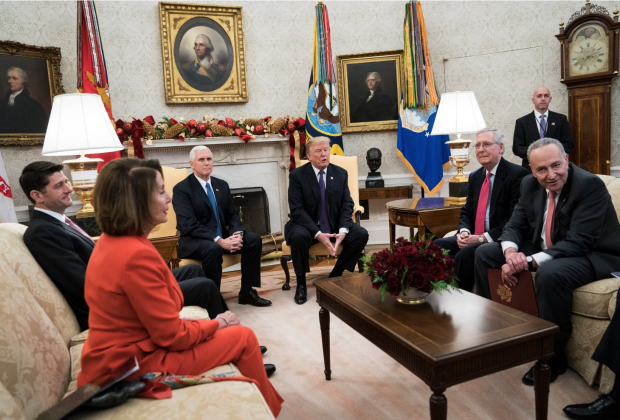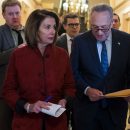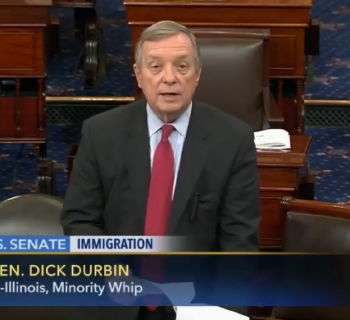By Robert Costa, David Nakamura and Ashley Parker ~ Washington Post ~ January 4, 2018
President Trump escalated tensions with Democratic leaders Tuesday over the fate of young undocumented immigrants known as “dreamers,” claiming the lawmakers are “doing nothing” to protect them from deportation as a key deadline nears, even though last year he ended the Obama-era program that allowed those immigrants to stay in the country.
But the Twitter salvo masked a murkier reality as lawmakers returned to Washington: Trump remains open to negotiations on a charged issue that has vexed him since his presidential campaign — and his brash partisanship was widely seen as a nod to his base rather than a sudden turn in the talks.
Inside the White House and the Republican Party, Trump is caught in a thicket of political pressures as he maps out possible requisites for a deal.
Many of his supporters are clamoring for a standoff over funding for his promised, gigantic wall along the U.S.-Mexico border, while some aides and GOP officials are reminding him of his pledge last year to “show great heart” toward dreamers — immigrants brought to the United Statesillegally as children.
“He’s got a very simple core problem. His base regards DACA,” the Deferred Action for Childhood Arrivals program, “as a sellout,” said former House speaker Newt Gingrich, a Trump ally. “He personally gets it, and he personally wants to solve it, but he’s got to get something for doing it.”
The Trump administration released a list of hard-line immigration principles Oct. 8, which could threaten to derail a deal in Congress to protect "dreamers." (Elyse Samuels/The Washington Post)
During his recent visit to his Mar-a-Lago resort in Palm Beach, Fla., Trump spoke at length with members of his inner circle about those concerns, according to three people familiar with the conversations. Trump groused that because Democrats, in his view, were unwilling to work with him on the GOP tax plan that passed last month, he could not expect them to work with him on the dreamers issue, either, and he warned he would be quick to blame them if discussions fell apart, the people said.
But Trump also expressed hope that he could find a way to persuade some red-state Democrats to support funding for the wall and would keep prodding them throughout January, the people added.
Even if Trump bends some Democrats to his will, many moderate Republicans are wary of the wall proposal and its implications in their own races, and they have asked congressional GOP leaders to act swiftly to address dreamers regardless of whether Democrats agree to Trump’s demands.
“The president is boxed in a corner,” former Trump adviser Sam Nunberg said. “He knows the base sees the wall as a threshold issue, and they’re worried that establishment Republicans and Democrats want a straight deal, without funding for the wall. But with some Republicans in Congress looking to possibly tie the issue to the budget fight, getting what he wants will be difficult.”
Senior aides to Democratic leaders said Tuesday that they are not taking Trump’s tweets literally, given his shifting stances on immigration matters. More important, they said, is what is said inside private meetings — and who attends.
Democratic aides said they took notice when White House Chief of Staff John F. Kelly — and not senior policy adviser Stephen Miller, a border hawk — showed up at a December meeting with leading senators.
At times, “it’s unclear who we’re even negotiating with in the White House,” one House Democratic aide said.
Here's a look at the "dreamers" whose DACA protections are set to expire.(Jenny Starrs/The Washington Post)
Where Trump ultimately lands — and whether he could accept border-security provisions other than a physical wall — is likely to consume Capitol Hill in the coming weeks. How the president proceeds could shape the contours of the upcoming midterm elections, where most centrist Republicans are eager to avoid angering voters in states with growing Hispanic populations.
But Trump faces a potential revolt on his right, should he be seen by conservative Republicans as working too closely with Democrats or failing to secure substantial wall funding, which is in part why he keeps signaling his commitment to the wall on Twitter, according to his associates.
Former White House chief strategist Stephen K. Bannon and other allies, such as House Freedom Caucus Chairman Mark Meadows (R-N.C.), are increasingly urging Trump to hold to his hard line. A person close to Bannon said Tuesday that if Trump does not begin to build the wall this year, his allies on talk radio and television, and at Breitbart News, which Bannon oversees, will “freak out.”
A Tuesday headline at Breitbart blared: “Trump’s Prioritizing DACA Illegal Aliens Breaks with ‘No Amnesty’ Commitment.”
Ed Brookover, a former Trump adviser, said the president’s challenge in January will be “whether he can take a little bit of the steam out of the tea pot” in the Republican base “and figure out if he can get something done.”
Leaders from both parties will meet with White House officials Wednesday at the Capitol to discuss the future of the roughly 700,000 immigrants who were enrolled in the deferred-action program in September when Trump announced its termination, along with the impasse over the budget. Legislative Affairs Director Marc Short and Office of Management and Budget Director Mick Mulvaney are slated to attend the gathering.
The bulk of those dreamer work permits will begin to expire March 5 unless Congress takes action, although thousands of young people have already seen their permits expire since the government stopped accepting renewal applications in October. Funding for the federal government expires later this month.
When asked Tuesday for details about Trump’s position, White House press secretary Sarah Huckabee Sanders said he is engaged in the negotiating process and called it a priority.
“The president wants to have responsible immigration reform. He said before that he would like to include a DACA resolution in that process, and we hope to be able to work with members of Congress to get that done,” Sanders said.
Hogan Gidley, a White House spokesman, added in an email that Trump will seek “ensuring interior enforcement, eliminating the visa lottery program and ending chain migration” as part of a dreamers deal.
Trump has pressed for additional spending on border-security measures aimed not just at building a wall but also adding thousands of immigration enforcement officers and additional immigration judges to ramp up deportations. He seized on two recent terrorist attacks in New York committed by immigrants to call on Congress to end a long-standing diversity lottery that provides green cards to 50,000 immigrants a year from mostly African nations, as well as enact deep cuts to legal immigration channels for family members of U.S. citizens and legal permanent residents, which critics refer to as “chain migration.”
Trump tweeted late last month that “there can be no DACA without the desperately needed WALL,” among other demands. He tweeted Tuesday that Democrats should agree to his terms or risk “activists and Hispanics” eventually “falling in love” with Republicans.
Trump has appeared to shift his position since announcing the termination of the DACA program in September, making the unfolding political drama harder to read for leaders in both parties.
In the days after that decision, Trump suggested that he would be open to a deal with Democrats that included providing legal status for immigrants in the program in exchange for additional border-security measures, and that a physical wall did not necessarily have to be among the immediate concessions. The wall, he said then, would “come later.”
But in recent months, and after some conservatives railed against his remarks, the president has hit Democrats as soft on immigration and signaled that wall funding, along with curbs to legal migration long sought by border hawks, would have to be included in any DACA deal.
Democrats have said they will refuse any deal that includes such measures, which are strongly opposed by immigrant rights groups.
“We are firmly committed to swiftly passing the DREAM Act, which we know would pass with bipartisan support if brought to the floor,” House Minority Leader Nancy Pelosi (D-Calif.) wrote Tuesday in a letter to Democratic colleagues, referencing legislation that would grant conditional residency to dreamers.
None of the measures Trump has advocated for is new. Comprehensive immigration bills in 2007, under President George W. Bush, and in 2013, under President Barack Obama, included hundreds of miles of additional border fencing along with reductions, over time, to legal immigration levels. Both were backed by many Democrats. In both of those cases, lawmakers also proposed providing a path to citizenship to dreamers and millions of other undocumented immigrants. Those efforts ended in failure.
Advocates for dreamers are on edge about the tight time frame for negotiations.
“I think a longer-term deal with all these different things everyone is talking about is very challenging in this climate,” said Leon Fresco, an immigration lawyer and former aide to Senate Democrats who worked on the 2013 bill. “It’s very difficult to get the kinds of change necessary to make both sides happy.”
Veteran Democrats said that Trump’s ambition for a border-wall-for-dreamers deal is based more on aspiration than sharp political calculation, because most Democrats see an upside to rallying against Trump’s proposed structure, which their party’s base has cast as an anathema to American values.
“Democrats have the high ground on this issue in that DACA is extremely popular and the border wall is extremely unpopular,” said Geoff Garin, a Democratic pollster. “So the deal Trump is offering is a very bad deal. If the polling was different, maybe Trump could drive a harder bargain, but Democrats don’t feel a need to concede.”
Source: By Robert Costa, David Nakamura and Ashley Parker ~ Washington Post
Mike DeBonis and Josh Dawsey contributed to this report. Robert Costa is a national political reporter at The Washington Post.
David Nakamura covers the White House. He has previously covered sports, education and city government and reported from Afghanistan, Pakistan and Japan.
Ashley Parker is a White House reporter for The Washington Post. She joined The Post in 2017, after 11 years at The New York Times, where she covered the 2012 and 2016 presidential campaigns and Congress, among other things.







